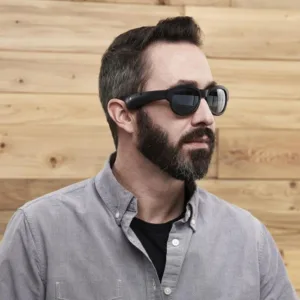This week at SXSW, Bose introduces Bose AR, the world’s first audio augmented reality platform, and glasses to hear— a Bose AR prototype that launches the future of mobile sound.
Bose also announces its SDK schedule date for developers, manufacturers, and research institutions, along with collaborations currently under way, and venture funding for related start-ups.
Unlike other augmented reality products and platforms, Bose AR doesn’t change what you see, but knows what you’re looking at— without an integrated lens or phone camera. And rather than superimposing visual objects on the real world, Bose AR adds an audible layer of information and experiences, making every day better, easier, more meaningful, and more productive.
Bose AR debuts a minuscule, wafer-thin acoustics package developed specifically for the platform, representing the future of mobile micro-sound with jaw-dropping power and clarity. It can be seamlessly built into headphones, eyewear, helmets and more, with no compromise to their existing functionality. And it allows simple head gestures, voice, or a tap on the wearable to control content— replacing the need to swipe, type, or tap a touchscreen for the same commands.
“Bose AR represents a new kind of augmented reality— one that’s made for anyone and every day,” said John Gordon, vice president of the Consumer Electronics Division at Bose. “It places audio in your surroundings, not digital images, so you can focus on the amazing world around you— rather than a tiny display. It knows which way you’re facing, and can instantly connect that place and time with endless possibilities for travel, learning, music and more. And it can be added to products and apps we already use and love, removing some of the big obstacles that have kept AR on the sidelines.”
Bose prototype glasses— augmenting what you hear, not what you see
The first Bose AR wearable— a prototype pair of glasses— was engineered and manufactured by Bose. They’re Bluetooth® compatible with microphones for calls, Siri or Google Assistant. And they debut a new proprietary technology that keeps audio private. With an ultra-slim, ultra-light, ultra-miniaturized acoustic package embedded discreetly in each arm, they can fit, function and look like standard eyewear, but sound and function more like Bose headphones— delivering amazing, lifelike performance that no one can hear but you.
The Bose AR platform
The Bose AR platform is purposely straightforward, focused on improving daily life instead of extremes. In addition to delivering stunning audio quality for listening to music, talking on the phone, or using VPAs, a Bose AR wearable uses sensors to track head motion, and the GPS from an iOS or Android device to track location. The sensors send the motion and location data to a Bose AR-enabled app that aggregates the information, sending relevant, real-time content back to the user’s ears instantly. It’s all done hands-free, heads-up, and wirelessly, so there’s no need to grab, read or touch the phone. And it can be used for multiple applications.
For travel
Bose AR can make every trip easier and more meaningful, transforming sightseeing into sighthearing. Like simulating historic events at landmarks as you view them— so voices and horses are heard charging in from your left, then passing right in front of you before riding off in the direction of their original route, fading as they go. Or letting you listen to a renowned speech “pinned” precisely to the famous person in a monument’s statue. Or telling you which way to turn towards your departure gate while checking in at the airport.
For learning
Bose AR can make the world a classroom. Like translating the sign you’re reading. Or telling you the word or phrase for what you’re looking at in any language. Or explaining the story behind the painting you’ve just approached.
For music
Bose AR can put playlists right in front of you, so you can control them with gestures as easily as voice or touch. With your wearable on, you can choose or change your music with simple head nods indicating yes, no, or next.
For every day
Bose AR doesn’t interfere with a wearable’s primary purpose— it adds useful information based on where you look. Like the forecast when you look up, or the restaurants on the street you look down.
Collaborations
The Bose AR platform is open to approved developers and manufacturers. Collaborations underway include ASICS Studio, Strava, TripAdvisor, TuneIn, and Yelp.
Bose is also collaborating with academic research institutions, including the MIT Media Lab to advance human interaction related to augmented audio reality, and the NYU Future Reality Lab.
Additional agreements have non-disclosure terms and will be announced in the future.
Venture funding available
Bose will invest up to $50 million in start-ups focused on apps, services, or technologies for the Bose AR platform. More information can be found on the Bose Ventures site.
SDK and availability
The Bose AR SDK, and limited quantities of a refined and updated version of the Bose AR glasses, will be available this summer. Sign-up information and details can be found at Developer.Bose.com/Bose-AR.
About Bose corporation
Bose Corporation was founded in 1964 by Dr. Amar G. Bose, then a professor of electrical engineering at the Massachusetts Institute of Technology. Today, the company is driven by its founding principles, investing in long-term research to develop new technologies with real customer benefits. Bose innovations have spanned decades and industries, creating and transforming categories in audio and beyond. Bose products for the home, in the car, on the go and in public spaces have become iconic, changing the way people listen to music.
Bose Corporation is privately held. The company’s spirit of invention, passion for excellence, and commitment to extraordinary experiences can be found around the world— everywhere Bose does business.

